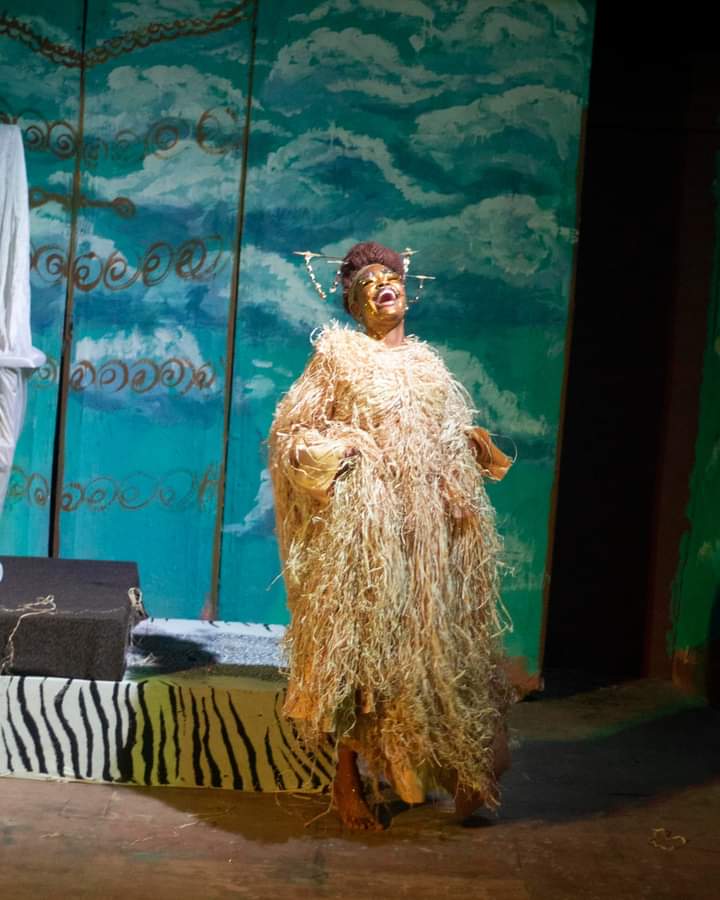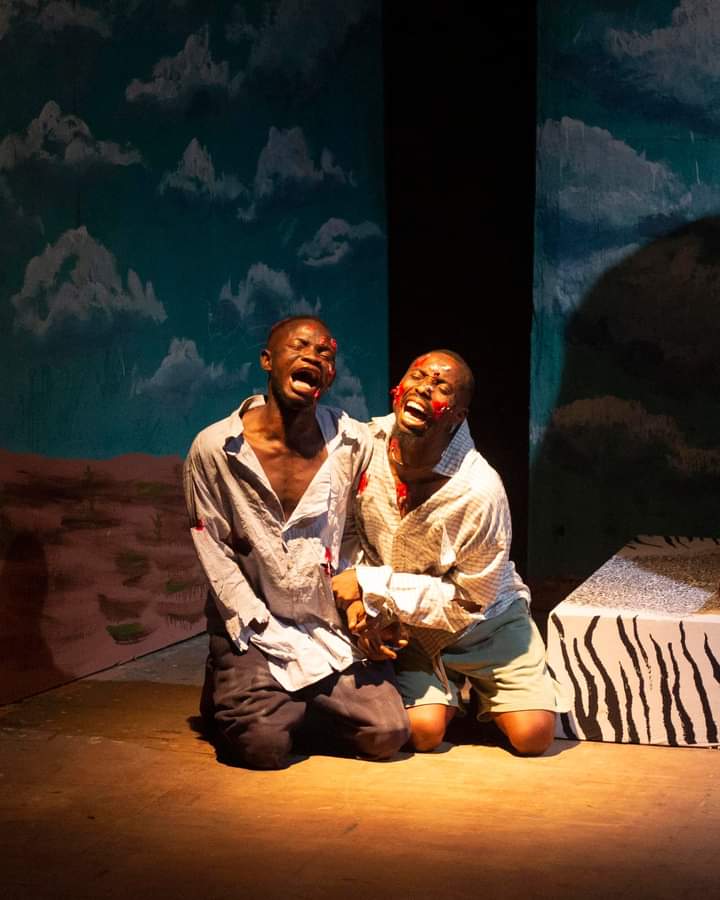
What happens to us after we die?
For ages, the question of the afterlife has inspired theories and beliefs across disciplines, peoples and cultures. Through its endless stretch of the imagination, art has propelled enquiries into this existential puzzle where religion, science and philosophy often exhaust their reach. In Awele, Cheta Igbokwe weaves a delightful tapestry of culture, philosophy, poetry and satire with such boundless artistic imaginations, directing his gaze and ours upon cosmological reaches.
Awele premiered on June 21, 2023, at the New Arts Theatre of the University of Nigeria, Nsukka, and was performed under the auspices of the Maestro Theatre Company. The play begins with a choral melody before lights come on to reveal the scenes, the celestial court of Awele (Grace Okonkwo), the eponymous deity of rebirth and journey. Her assistant, Olekota (Dansey U. Mbah), bestrides this space with a certain magnetic flair, ushering in a group of five humans set for rebirth, their previous lives having ended in grim, untimely circumstances.
The intertwined experiences of loss and grief often inspire art that records pain, interrogates it and seeks solace. One could be forgiven for assuming that Awele arose out of grief alone, as the playwright lost both of his parents within the space of six months, not too long ago. With Awele, Igbokwe glorifies the Igbo concept of nhapu, a cultural understanding that death is only a transitional passage into new forms of life. As such, Awele is an invocative celebration of art and spirituality, culture and tradition, language and melody, offering a transcendental adulation of life, embodied in birth and death.
In the first act of Awele, a group of human souls linger in the interstice of life and death, awaiting transitional blessings from Awele. These rites require a mediated surmise of their lives by Olekota and begin with the First Woman (Chika Ugorji), whose unfortunate demise came at the hands of a charlatan pastor, in her desperation to birth a child. When Awele vows to exact vengeance on this charlatan, the audience jarringly cries their approval. The next souls after this are those of a Motorcyclist (Toochukwu “Teekay” Oguayo) betrayed in his quest for love, and the Second Woman (Lauretta Ikeme) whose dreams of travelling the globe are wickedly ended by organ harvesters. As each of these characters’ tales are relayed by Olekota, the audience oscillates between feelings of anger, pity, and compassion. When the characters are blessed with rebirth and divine fortifications at respective intervals, transitioning into light and buoyed by stirring songs, the residual sense of this performance is one we all love to incubate: that in the end, good people do earn justice, and that is something worth holding onto.

Trouble begins in the play with the last two human beings, a pair of twins named Mgbada (Innocent “MC Onachi” Chisom) and Ehi (Simon Ugwu). At first, their strange names seem to be only for comic effect, as they respectively translate to “antelope” and “cow” in Igbo. But when one considers Igbokwe’s tendency to elevate names beyond mere identity (as he did with Homecoming), an onomastic foreshadowing becomes more apparent. Olekota describes the pair as “good thieves,” an expression which provokes laughter across the audience. But this laughter vanishes and is replaced by sadness when it is revealed that the twins were victims of jungle justice. Unlike those before them, the twins refuse Awele’s offer of rebirth, to the surprise of the audience. This leads to the pivotal act of the play, which revolves around the conundrum of free will and choice.
Abraham Maslow, an American psychologist, once called human beings “a wanting animal.” Awele echoes this when she enthuses that human longings are “endless,” as they have unidentified needs. In the second act, the twins seek to configure their destinies in the reincarnations awaiting them, with Mgbada imploring, “Let us choose our own paths in life!”

As a deity inhabiting a majestic ether, Awele undoubtedly embodies spiritual wisdom. But how much does a goddess know about being human? Awele’s ignorance of humanity manifests in her assumption that human beings are born free. The twins attempt to correct Awele’s belief before arguing that they should be allowed to choose their paths in the rebirths awaiting them.
Awele agrees to this, but to prevent the twins from making terrible choices, she narrates the instructive folktale of Origbu, the boy whose greed led to his premature end. With the play’s hilariously transformative ending, Igbokwe provides therapeutic relief, the sort that provides new insights into the workings of the human condition, while still reinforcing older established truths. The play reminds us of human powerlessness in the arena of existence, buffeted as we are by forces beyond our control. But more importantly, we experience beauty through Igbokwe’s masterful handling, as well as through the cast and crew’s deft execution of art, sound, action, and words. From this unforgettable spectacle, this homage to culture and spirituality, we are reminded that there is life after death. This charges us to live life fully, a lesson firmly resounded in Awele’s final words: “Don’t look back, the world is yours!”
You can watch the entirety of Awele on YouTube here
CREW: Playwright: Cheta Igbokwe, Director: Ugochukwu Ugwu, Producer: Innocent “MC Onachi” Chisom, Production Manager: Roland Odo, Music Director: Dansey U. Mbah (Mr. Dansey Original), Technical Director: Mr. Richard Umezinwa, Assistant Director: Lorenzo Menakaya, Costume: Power Egbogu & Amazingrace Okonkwo, Stage Manager: Roland Odo, Cinematographer: Chimereogo Nwoke, Photographer: Obadiah Chidera Paul, Playbill Designer: Iloanusi Chukwuma Goodluck.



Average Rating